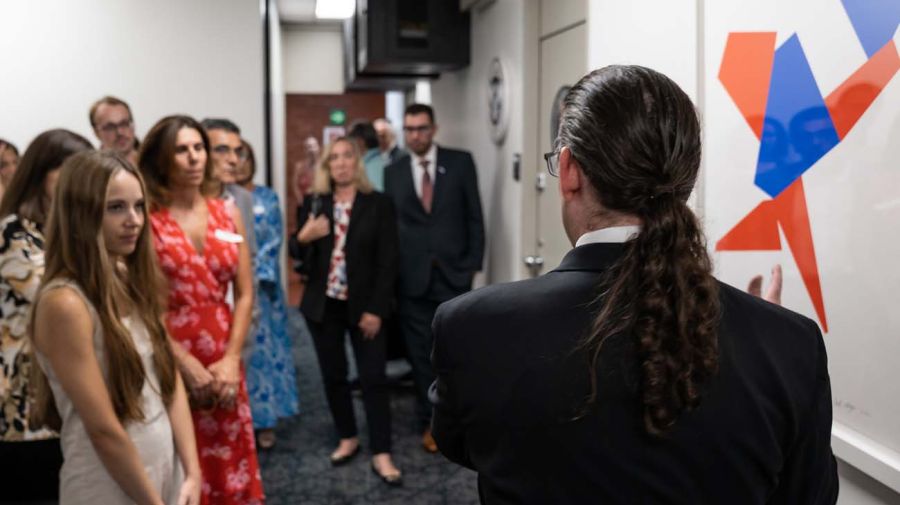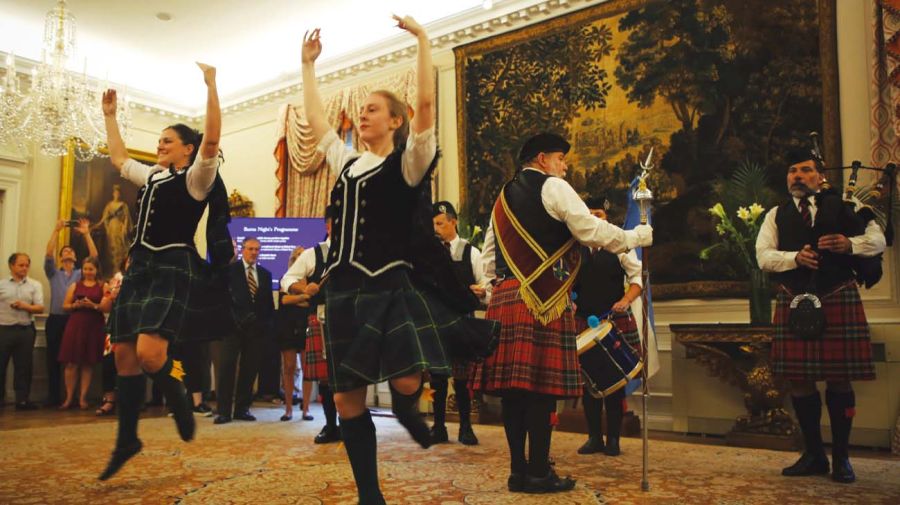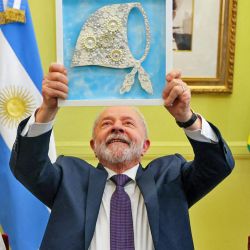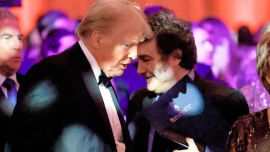CELAC SUMMITRY
The VII Summit of the Community of Latin American and Caribbean States (CELAC in its Spanish acronym) was held on Tuesday in this city with the presidents of Ecuador, Mexico, Peru and Venezuela the main absences among the hemispheric bloc’s 33 members. Among these absences Venezuela’s Nicolás Maduro caused by far the biggest news splash, both because of the controversial nature of his régime and because he changed his mind about coming almost at the last minute. The absences of Maduro and Peruvian President Dina Boluarte did not prevent protests against both of them although Frente de Todos supporters also rallied in Maduro’s support. Host President Alberto Fernández inaugurated the event with an opening speech in which he described democracy as being at risk from a "recalcitrant and fascist far right" while defending Cuba and Venezuela due to the "blockades they have suffered for decades." He also requested applause for Brazil’s return to CELAC. This set the tone for a generally centre-left thrust to the Summit although Uruguayan President Luis Lacalle Pou struck a dissonant note, saying: “There are countries here which do not respect democracy” and taking umbrage over Economy Minister Sergio Massa calling Uruguay a “younger brother.” The concluding statement of the Summit consisted of vague generalisations more than concrete proposals.
LULA AND ALBERTO TEAM UP
Brazilian President Luiz Inácio Lula da Silva arrived here on Sunday night to give himself a full day ahead of Tuesday’s Community of Latin American and Caribbean States (CELAC in its Spanish acronym) Summit to discuss the coordination of South America’s two largest economies with host President Alberto Fernández. The two presidents announced the relaunch of the bilateral relationship, starting with an integration agreement whose focus was on financing energy projects and a common currency. Both men accompanied this announcement with strong criticisms of the judiciary in their respective countries as well as of their predecessors, Jair Bolsonaro and Mauricio Macri, and both backed adding Venezuela and Bolivia to Mercosur, as well as pledging a commitment to revive the Unasur regional bloc. Itamaraty also took Lula’s presence in Argentina as the occasion to announce the appointment of Julio Glinternick Bitell, 62, as Brazil’s new ambassador to Argentina. Currently Ambassador to Rabat, Bitelli served fully 10 years at the Buenos Aires Embassy (2003-13, all Kirchnerite years) before starting his ambassadorial career – Tunisia (2013-2015) and Colombia (2016-2019) before returning to North Africa in Morocco. Ex-president Dilma Rousseff had been widely tipped for the post in recent days.

NEW ART AT US EMBASSY
The United States Embassy in Argentina on Wednesday proudly revealed an impressive new collection of art that it hopes will freshen up things at the overseas outpost. A selection of invited guests – including figures from local museums, painters and media – were shown original pieces by Jeff Koons, Jonathan Becker, and Sara Sosnowy, among others, as well as an impressive behind-the-scenes series of artists’ studios captured while they were hard at work. The artistic reshuffle, overseen by Joseph Angemi, was explained in detail to guests by the curator, who said the pieces had been provided by the Foundation for Art and Preservation in Embassies, a public-private partnership dedicated to providing permanent works of American art for the United States.
“Since arriving to Buenos Aires a year ago, it has been a goal of mine to freshen up our Embassy,” said Ambassador Stanley, who said the building should “reflect our country’s diversity and creativity.” “Hundreds of people work in and visit our embassy every day, so the space should be as interesting and enjoyable as possible,” he argued. The diplomat also offered those at the event a rare chance to see his personal office at the building, showing off original art that included two pieces by a local artist and a unique piece showing a representation of late US Supreme Court justice Ruth Bader Ginsburg.
BÁEZ SOSA TRIAL NEARS END
The trial of the murder of law student Fernando Báez Sosa just over three years in Villa Gesell entered its final stages last week with prosecutor Fernando Burlando predictably asking for life imprisonment for the eight rugby-players accused of bashing the youth to death while their defence lawyer Hugo Tomei equally predictably requested their acquittal. What was less predictable was the apology given by the defendants while their lawyer was requesting their acquittal – they denied any intention of killing anybody. The Dolores court is due to deliver its verdict on February 6.
POPE BEMOANS POVERTY
A lengthy Associated Press interview with Pope Francis in midweek included some trenchant criticisms of poverty and inflation in his native land. “In 1955 when I finished secondary school, poverty levels were five percent and today they are 52 percent. What happened? Bad administrations and bad policies,” said the pontiff, also being scathing about an inflation reaching 94.8 percent last year. President Alberto Fernández took the papal comments as a backhanded compliment for the first Peronist government while presidential spokesperson Gabriela Cerruti limited the blame for the poverty and inflation to the four years of the Mauricio Macri presidency.

UK AMBASSADOR BRINGS BACK BURNS NIGHT
Aberdeen-born British Ambassador Kirsty Hayes honoured Burns Night in style at the Embassy residence on Wednesday evening. For the uninitiated, Burns Night (the most important event in the Scottish calendar alongside Saint Andrew’s Day) marks the anniversary of the 1759 birth of Scotland’s most famous poet Robert ‘Rabbie’ Burns birth with the national dish of haggis (its preparation assisted by television personality Ivan de Pineda on this occasion) washed down with whisky among other beverages, bagpipes and Highland (or Ceilidh in the Gaelic) dancing with the guests invited to join. Peter Macfarlane (possibly the only Scottish surname at the event) delivered an extremely erudite biography of Burns (1759-1796) with the assistance of histrionic political attaché Sam Gilbert and an enjoyable evening concluded with toasts to the lassies and laddies respectively delivered by Gilbert and Hayes.
BIELSA ‘OVER THE TOP’
A leaked reproach of Chilean Foreign Minister Antonia Urrejola directed against Argentine Ambassador to Chile Rafael Bielsa complicated relations between the two sides of the Andes during last Tuesday’s Summit of the Community of Latin American and Caribbean States (CELAC in its Spanish acronym) hosted by Argentina. Bielsa had rubbished the Chilean government’s decision to turn down the US$2.5-billion Dominga mining project, of benefit to Argentina because it came with a port also offering a potential Pacific outlet for Argentine exports – the tone of his criticism irked the Santiago government in particular since he reduced the environmental objections against the project to a concern for a few rare animal species. In a message for the ears of her Argentine colleague Santiago Cafiero only, Urrejola said: “Bielsa immediately accepted that he had screwed up. The irritating thing is the Dominga issue where Bielsa went over the top … opting to align himself with the right on this one,” also pointing out the Chilean Cabinet’s rejection of the project was unanimous. Chilean Foreign Ministry Communications Director Lorena Díaz immediately resigned over the leak.
MACRI PRO BULLRICH?
Ex-president Mauricio Macri and PRO party chair Patricia Bullrich huddled together in the first half of the week at the former’s holiday home in the Cumulén gated community near Villa La Angostura, Neuquén, along with their respective spouses Juliana Awada and Guillermo Yanco. The quartet posed for a photograph considered of symbolic importance in the tussle for the opposition presidential candidacy with the two leaders agreeing: “We are the change or we are nothing.” While keeping his own candidacy up in the air and yet to choose between Bullrich and City Mayor Horacio Rodríguez Larreta, Macri thus defined a hard line for the opposition campaign. Bullrich criticised Economy Minister Sergio Massa for kicking problems ahead and credited her own calls for Venezuelan President Nicolás Maduro’s arrest with the Bolivarian leader’s decision not to attend last Tuesday’s CELAC (the Spanish acronym for the Community of Latin American and Caribbean States) Summit.
ELECTION EXPENSES
The government published in the Official Gazette last Tuesday a contract for electoral expenses with the Mint totalling 942,134,800 pesos, of which 811,282,500 pesos are earmarked for printing 50.5 million electoral rolls with the ballots yet to follow. The PASO primaries are scheduled for August 13 and the general elections for October 22.
http://www.batimes.com.ar/noticias/argentina/stories-that-caught-the-eye-january-20-to-27.phtml
ARGENTINA, 1985 NOMINATED
Argentina, 1985, Santiago Mitre’s film portraying the trial of the military juntas in that year was nominated on Tuesday as one of the five candidates for Best International Feature Film at this year’s Oscar ceremony to be held in the second weekend of March. It was the only non-European film nominated with Belgian, German, Irish and Polish productions its rivals for the award.
FIREMEN TO THE RESCUE
Firemen in the Greater Buenos Aires suburb of Claypole last Sunday saved the life of a baby who had stopped breathing for several minutes, arriving on the scene ahead of medical personnel and applying the necessary emergency treatment.
























Comments